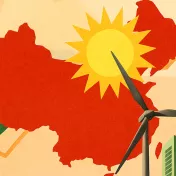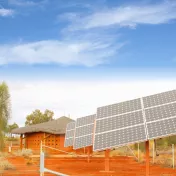Extreme weather events are increasing in intensity and frequency due to the impacts of climate change. Without appropriate intervention, Loss and Damage will be inevitable, despite efforts at adaptation, mitigation, and even disaster risk management. Losses from climate change are already occurring: for example, the loss of plant and animal species or even human lives. Damages, on the other hand, include destroyed infrastructure, which disrupts the economy.
G20 members recognise the losses and damages caused by climate change. By stating this in the G20 Bali Leaders’ Declaration, they reaffirm the importance of achieving the goals of the Paris Agreement. In addition, at COP27 in Sharm el-Sheikh, Loss and Damage was one of the key agenda items, with the Parties agreeing on new financing arrangements for Loss and Damage.
To understand how Loss and Damage financing will be discussed after the G20 Summit led by India and after COP27, the Indonesia Research Institute for Decarbonisation (IRID) and Germanwatch hosted a focus group discussion on 11 January 2022. The event aimed to gather information on different initiatives on Loss and Damage financing, including access modalities, challenges, and coping strategies.
Speakers from various institutions presented the dialogue’s main points in the online discussion, namely Kairoz Dela Cruz, Deputy Executive Director of the Institute for Climate and Sustainable Cities (ICSC); Martin Kipping, Head of Climate Policy Division, Federal Ministry for Economic Cooperation and Development (BMZ); and Shikha Bhasin, Senior Programme Lead Technology, Finance and Trade, Council on Energy, Environment and Water (CEEW).
People’s Survival Fund Philippines
In 2012, the People's Survival Fund (PSF) was established as a result of an amendment to the Philippines' climate change policy that was adopted in response to the vast amount of funding required to address the impacts of climate change. The PSF is a type of grant-based funding that the Philippine Government provided with an initial base funding of USD 20 million per year. The Philippine Congress and Senate supported this idea. They were even willing to allocate more if the required funding exceeded the designated USD 20 million.
However, the implementation of the PSF has faced several challenges. First, local governments, and even the national government, need more time to understand the idea of Loss and Damage financing and its prerequisites. Second, improvements are needed in terms of science and data completeness. It should also be stressed that the existence of multiple funding pots does not necessarily mean that more money is available for Loss and Damage. What matters is whether the funding sources are available or not.
Global Shield against Climate Risks
The G7 countries and The Vulnerable 20 Group of Finance Ministers (V20) established the Global Shield against Climate Risks to ensure quick financial support in the event of climate disasters. Germany made an initial contribution of EUR 170 million. Another EUR 40 million were provided by other countries (Joint Press Release of V20, G20, and the German Federal Ministry for Economic Cooperation Development, 2022).
The Global Shield aims to implement a systematic, coherent, and sustainable approach to strengthening the climate and disaster risk finance and insurance (CDRFI) architecture. This objective will be achieved by evidence-based, country-specific safeguard gap analyses that take into account disaster risk reduction (DRR) and adaptation efforts.
Countries that will be financed by the Global Shield are selected based on prioritised vulnerability to climate and disaster risks. Currently, seven countries are selected to be covered by the Shield, namely Bangladesh, Costa Rica, Fiji, Ghana, Pakistan, the Philippines, and Senegal. The Small Island Developing States (SIDS) region in the Pacific Ocean is also included.
Loss and Damage under the Indian G20 Presidency
Developing countries have been promoting the issue of Loss and Damage through the United Nations Framework Convention on Climate Change (UNFCCC). At the moment, 34% of the Parties have included Loss and Damage in their Nationally Determined Contributions (NDCs) (UNDRR, 2020). With 80% of its population living in regions that are highly vulnerable to extreme weather, India is one of the countries that faces extreme risks regarding Loss and Damage.
Currently, there are financing pledges from developed countries such as Germany, the European Union, Austria, France, and Denmark. There are also sources of financing for Loss and Damage related actions, such as the Green Climate Fund (GCF), the Global Shield Financing Facility, the Global Facility for Disaster Reduction and Recovery, and others (CEEW Compilation, 2023).
Although Loss and Damage has been included in the UNFCCC agenda and efforts and initiatives have been taken to ensure its funding, the possibility of discussing this topic in the G20 dialogue processes in 2023 is still limited. However, the Indian G20 Presidency welcomes concrete proposals related to Loss and Damage, such as specific climate action.
India also supports efforts to collect accurate data on Loss and Damage. This includes evidence-based knowledge on the impacts climate change, contributing to the development of a global vulnerability index, and disaster resilient infrastructure technologies.
The future of Loss and Damage financing
Based on the discussion, it can be concluded that it will take time for each country to understand the Loss and Damage funding arrangements and to check all the prerequisites. However, developing countries should not wait for a new mechanism for Loss and Damage financing, but should utilise the existing financing instruments.
Addressing Loss and Damage is an essential pillar of climate action. Although closely related to mitigation and adaptation efforts, it is necessary to address Loss and Damage separately. This requires cross-sectoral cooperation. Local academic institutions play a key role in collecting up-to-date data and evidence and thereby provide powerful ammunition to address Loss and Damage and to develop relevant adaptation strategies.
Of course, much more needs to be done to make the ideal of paying for Loss and Damage a reality. Individual countries, especially those with high levels of climate vulnerability, should continue to push this topic forward. All countries can at least contribute to providing the data and knowledge that are key to addressing Loss and Damage. In addition, cross-sectoral cooperation is needed to plan for the financing of Loss and Damage.
------------------------------------------------------------
This blog post was first published in Indonesian on 10 February 2023 by our partner organisation Indonesia Research Institute for Decarbonization (IRID). To access the original article, please follow this link.






